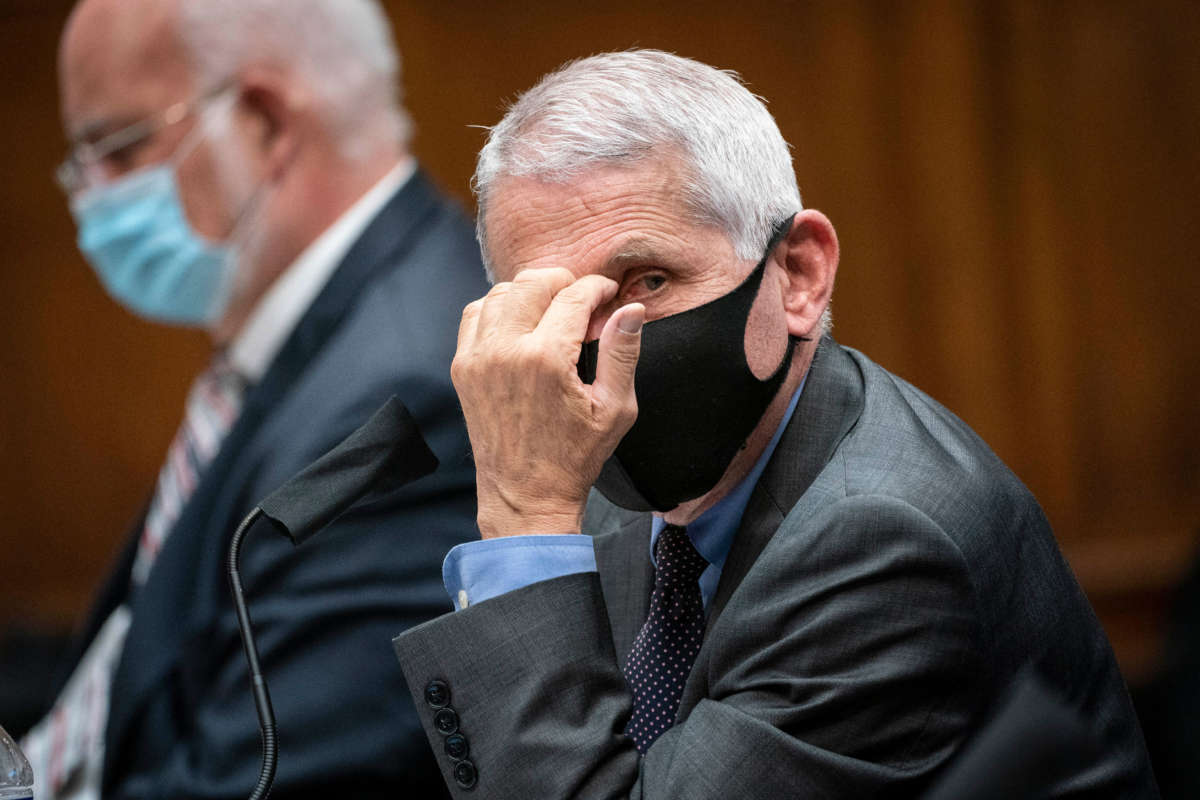Anthony Fauci, the director of the National Institute of Allergy and Infectious Diseases and a member of the White House’s coronavirus task force, expressed dismay at what he called “bizarre” attempts to discredit him by members of the Trump administration.
Earlier this week, a memo was leaked from the White House to reporters that stated the administration would soon be making attempts to disparage Fauci’s credentials as a trusted voice on COVID-19.
The memo stated in part that “several White House officials are concerned about the number of times Dr. Fauci has been wrong on things.” In one example, the document cited an interview Fauci had given in February where he had stated, “at this moment, there is no need to change anything that you’re doing on a day-by-day basis.”
But the memo also edited Fauci’s remarks to advance its critique of the public health expert. In that example, for instance, Fauci’s other words were omitted — including his warning that if the disease wasn’t taken seriously, the situation on the ground could change.
Speaking earlier this week to The Atlantic for an interview that was published on Wednesday, Fauci said the remarks directed toward him from the Trump White House were “totally wrong.” He also described himself as bewildered over why the attacks had come about in the first place.
“I cannot figure out in my wildest dreams why they would want to do that,” he said. “I think they realize now that that was not a prudent thing to do, because it’s only reflecting negatively on them.”
Fauci also described Peter Navarro, an adviser to the president who wrote a scathing op-ed against Fauci that was published on Wednesday, as someone he “can’t explain” and who is “in a world by himself.”
“It’s nonsense. It’s completely wrong. The whole thing is wrong. The whole thing is incorrect,” Fauci said of the attacks against him.
Even though he pushed back against criticisms, Fauci remained committed to looking for the good in the administration. “I think if you talk to reasonable people in the White House, they realize that was a major mistake on their part” to attack him, he said, “because it doesn’t do anything but reflect poorly on them.”
Fauci also described a recent meeting with White House chief of staff Mark Meadows, who spoke directly with the infectious diseases expert about the memo. Fauci’s conversation with Meadows seemed to demonstrate he cared more about helping the administration than repairing the damage caused to his image.
“I said that that was not particularly a good thing to do,” Fauci told The Atlantic. “Ultimately, it hurts the president to do that. When the staff lets out something like that and the entire scientific and press community push back on it, it ultimately hurts the president. And I don’t really want to hurt the president.”
Meadows did not offer him an apology on behalf of the White House, Fauci said.
He added that he has no intention of quitting his post, particularly during a pandemic. “I think the problem is too important for me to get into those kinds of thoughts and discussions. I just want to do my job,” he said.
Still, Fauci expressed at least a slight bit of aggravation toward the White House’s recent actions.
“I wish we didn’t have a lot of those distractions, which I think are noise that gets in the way. But I put that aside, try not to let it bother me, and just move ahead,” he added.
While Fauci said he still gets his opinion across to members of the coronavirus task force, who then relay them to the president, he also acknowledged that his interactions with Trump himself have come to a halt. For what reason, Fauci did not seem to know.
In a separate interview last week with The Financial Times, Fauci said he hadn’t briefed the president on coronavirus for months, and that the last time he even saw Trump at the White House was on June 2.
Press freedom is under attack
As Trump cracks down on political speech, independent media is increasingly necessary.
Truthout produces reporting you won’t see in the mainstream: journalism from the frontlines of global conflict, interviews with grassroots movement leaders, high-quality legal analysis and more.
Our work is possible thanks to reader support. Help Truthout catalyze change and social justice — make a tax-deductible monthly or one-time donation today.
